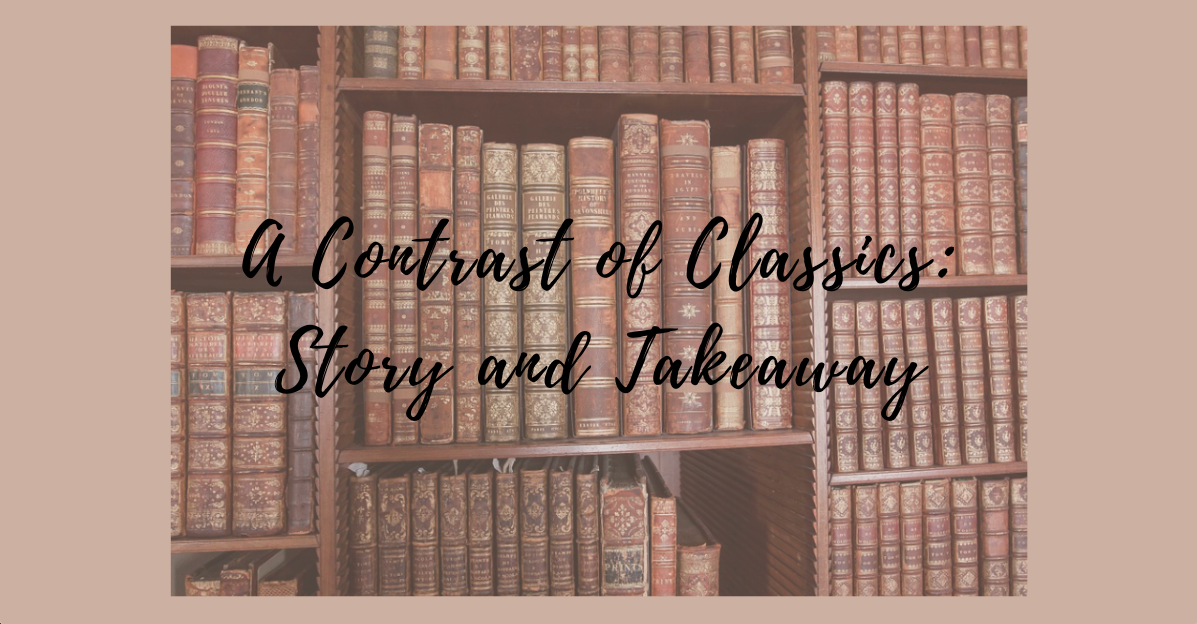Because everyone loves a good story
A Contrast of Classics: Story and Takeaway

What makes the plot of Pride and Prejudice more appealing than its Highbury counterpart? And what’s the difference between Emma and A Comedy of Errors? As you may have guessed, I have a theory about both. Read on to find out in this final installment of the series. (Woo-hoo!)
The Story of Pride and Prejudice
I first read Pride and Prejudice in high school. On my own. For fun. Yah, I was that kid—no TV and an overburdened bookshelf. But I’m glad I read the book before watching the movie because I got to savor the storyline. I’ve since watched and enjoyed a few movie versions, and as predictable as Elizabeth and Mr. Darcy’s union seems from my present vantage point, it’s still a lovely bit of work.
It has all the charm of a rags-to-riches tale without wallowing in the privations of the rags portion. The delight of seeing two stubborn people bend their wills to see life from a new perspective is satisfying, and their change is so gradual that it seem almost believable. The happy ending is unmitigated (although I wish more ill had befallen Wickham and Lydia). For those reasons and a great many more, I love the story of Pride and Prejudice.
The Story of Emma
I first read Emma in high school after finishing (and loving) Pride and Prejudice. Even then I could feel the difference. I squirmed as I read about the frivolous lives of the characters, with their matchmaking and dances and picnics and gossip. Yes, I know that Elizabeth Bennet’s life was comprised of much the same stuff, but as I mentioned last time, Emma lacks the consolation of a sensible heroine and so leaves me feeling adrift in a sea of misunderstandings.
When I had to study the book in college, I learned that Austen was often being satirical about her society and its values. That made me feel a little better, but it didn’t increase my enjoyment of the book. At that time, Jane Eyre was my jam, and Emma felt shallow by comparison.
But even now that I’m older and oh-so-much wiser, I still can’t say I enjoy the story of Emma. At least on the first perusal I was free to grit my teeth at the characters alone. Now that I know what’s going to happen, I also find myself exasperated at the blunders and misunderstandings. Instead of providing the usual humor of situational irony, it gives me situational anxiety instead. But someone must enjoy this style because movies abound with this same plot. It’s just not my cup of tea.
The Dialogue

The dialogue and writing style of Pride and Prejudice is golden. Little gems of wit glitter in every chapter. The first line alone is iconic: “It is a truth universally acknowledged, that a single man in possession of a great fortune, must be in want of a wife.” But every chapter boasts enough humor and truth to fill all the literary quote coffee mugs you’d like. Well done, Ms. Austen.
I do admit that Emma has some quotable lines, but the writing style feels more stilted to me. Maybe it’s because it was such an early book for Austen and she was still discovering a more natural, flowing style. Whatever the case, many of the lines that seem mug-worthy feel a bit forced, like Austen was inserting a previously-crafted thought (here’s looking at you, Mr. Collins). But my real beef with the writing style of Emma is the magnitude of tedious dialogue. Inane conversations are written out word for word, question for question, page after page. The reader could have gotten a full picture of the situation in half as many words.
My Takeaway: Less Is More
Which leads me to my takeaway. As you know, both books are comedies. They end with weddings and are full of blunders and capers throughout. Shakespeare himself often used this formula to great success. But the major difference between my enjoyment of A Comedy of Errors and Emma is one simple factor: brevity. Sure, P&P can’t be read in an hour either, but it doesn’t feel as laborious to me because I get lost in the story. Emma, however, contains almost 40,000 words more than Pride and Prejudice, and I’m willing to bet that most of those were spoken by Miss Bates.
The manageable length of a Shakespeare play makes the misunderstandings humorous instead of claustrophobic. Had Austen turned Emma into a three-hour play, I could have borne it much better. That’s probably why the movie versions of Emma are much more enjoyable for me. The characters are still aggravating, but the brevity allows for laughter, knowing the pain will be over soon. In my humble opinion, the point of Emma could have been made just as effectively in half as many pages—in fact, the point would have been better served.
And yes, I fully realize this is the pot calling the kettle black. I am verbose in the extreme. Please accept my apologies.
Happily Ever After
Now I’ve said my piece. Heckle me if you’d like. In fact, if you’ve tracked with me through this brief mini-series, you’ve earned the right to heckle. Also, if you’ve stuck with me this long, I thank and congratulate you. I hope my musings have helped you clarify your own opinions about these books, even if they’re polar opposites of mine.
So, until next time, I hope you have a wonderful holiday season! Here is some sage advice from Miss Elizabeth Bennet, and I hope you’ll be able to use it in 2022: “Think only of the past as its remembrance gives you pleasure.” Merry Christmas and happy New Year, friends!

Add a comment, and join the conversation!